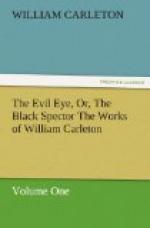“Well, then,” replied the friar, “you shall. The villain proposed marriage to this beautiful young orphan, and as he was a handsome vagabone, as I have stated, he was accepted; but his eyes, above all things, were irresistible. They were married by a Protestant clergyman, and immediately afterwards by a Catholic priest, who was far advanced in years. The lady would submit to no marriage but a legal one. The marriage, however, was private; for Hamilton knew that Essex was aware of his having been during this event a married man, and that his wife, who was a distant relation of the Earl’s, was still living. The marriage, however, came to Essex’s ears, and Hamilton was called to account. He denied the marriage, the old priest having been now dead, and none but the Protestant clergyman of the parish being alive to bear testimony to the fact of the marriage. He endeavored to prevail upon the clergyman also to deny the marriage, which he refused to do, whereupon he was found murdered. His wife by this marriage having learned from Essex that Hamilton had most treacherously deceived her, fell into premature labor and died; but her last words were an awful curse upon him, and his children after him, to the last generation.
“‘May the Eye that lured me to destruction,’ she said, ’become a curse to you and your descendants forever! May it blight and kill all those whom it looks upon, and render it dreadful and dreaded to all those who will place confidence in you or your descendants!’”
“God knows I couldn’t much blame her; it was her last Christian benediction to the villain who had destroyed her, and, setting-charity aside, I don’t see how she could have spoken otherwise.
“When the proofs of the marriage, however, were about to be brought against him, the Protestant clergyman, who, on discovering his iniquity, was too honest to conceal it, and who felt bitterly the fraud that had been practised on him, was found murdered, as I have said, because he was now the only evidence left against Hamilton’s crime. The latter did not, however, get rid of him by that atrocious and inhuman act. The spirit of that man haunts the family from that day to this; it is always a messenger of evil to them whenever he appears, and it matters not where they go or where they live, he is sure to follow them, and to fasten upon some of the family, generally the wickedest, of course, as his victim. Now, Mr. Woodward, what do you think of that family tradition?”
“I think of it,” replied Woodward, “with contempt, as I do of everything that proceeds from the lips of an ignorant and illiterate Roman Catholic priest.”
“Sir,” replied the friar, “I am not the inventor of this family tradition, nor of the crime which is said—however justly I know not—to have given rise to it; but this I do know, that no man having claims to the character of a gentleman would use such language to a defenceless man as you have just used to me. The legend is traditionary in your family, and I have only given it as I have heard it. If I were not a clergyman I would chastise you for your insolence; but my hands are bound up, and you well know it.”




